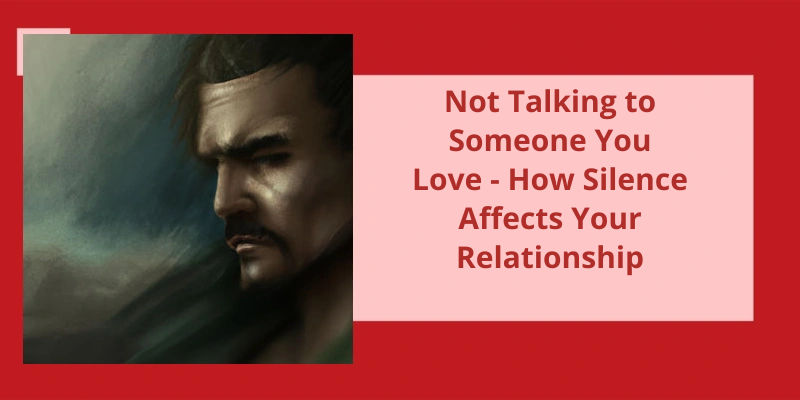When it comes to love, not talking to someone you love can be one of the most complex, confusing, and yet all too common experiences. Whether it stems from fear, pride, anger, or simply unclear communication, avoiding discussions with someone you care deeply about can create a rift that may be difficult to bridge. It may feel like an easier path at first, but the longer you go without dialogue, the harder it may become to reconnect. There are many reasons why people may choose not to talk to someone they love, and each situation is unique; however, the feelings of longing, regret, and uncertainty that can arise from this situation are universal. Ultimately, it’s important to remember that love and communication go hand in hand, and avoiding the discomfort of a conversation may ultimately cause more harm than good.
What to Do When Someone You Love Is Not Talking to You?
There will come a time in everyones life when you might find yourself in a situation where someone you love isn’t talking to you. It could be a close friend, family member, or even a romantic partner. In these situations, it’s essential to remain calm, composed and try to think with a clear mind. Remember that every relationship is unique, and it might take some time to heal.
Firstly, when someone isn’t talking to you, try to use a distinct mode of communication. You can send them an email, a text message or perhaps a handwritten letter. It entirely depends on the nature of your relationship and your rapport with the person. Make sure that you communicate in a respectful manner, without coming across as pushy or accusatory.
If some time has passed, and the person still hasnt reached out to you, it’s perhaps time to give them some space. It’s important to understand that people have different ways of coping with stress, anxiety or even difficult conversations. So, give them time to process and digest their thoughts before trying to communicate again directly.
Be understanding and patient. Remember to put yourself in their shoes and try to understand the perspective from which they’re coming. Sometimes, people just need time to sort out their emotions, and it might not be related to you. So, avoid jumping to negative conclusions or assuming the worst.
When you finally communicate with the person, be clear about your intentions. Try to understand the other persons perspective, what they expect from you, and what may have led to the conflict. Work together towards rebuilding the friendship, even if it takes time.
Finally, try not to demean the other person or your relationship with them on social media. It only adds fuel to the fire and worsens the situation. Keep private discussions private, and avoid sharing anything that could hurt or humiliate the other person.
When communication breaks down in a relationship, it can be a painful experience. It’s often difficult to know how to handle the situation when someone you love stops talking to you. However, there are practical steps you can take to navigate this difficult time. Here are 16 tips to consider when dealing with a loved one who no longer wants to communicate with you.
What to Do When Someone You Love Doesn T Want to Talk to You?
It can be incredibly challenging when someone you love doesn’t want to talk to you anymore. Whether it’s a romantic partner, a family member, or a friend, this type of rejection can leave you feeling hurt, confused, and abandoned. However, there are things you can do to cope with the situation and potentially repair the relationship.
First and foremost, it’s important to be honest with yourself and the other person about how youre feeling. You can try to communicate your thoughts and emotions in a respectful and kind way, which will help to prevent misunderstandings and conflicts. Being honest can also help to build trust and demonstrate your willingness to work on the relationship.
When someone doesn’t want to talk to you anymore, it’s important to respect their decision and their boundaries. Pressuring them to talk or pushing them to change their mind will only make things worse and could potentially damage the relationship further. Instead, give them the space and time they need to process their feelings and come to their own conclusion.
While it’s important to respect their decision, you can still take a proactive approach to repair the relationship. This might mean sending a thoughtful note or gift, expressing your feelings honestly and openly, or seeking out the help of a therapist or mediator to facilitate a conversation.
It’s essential to remain optimistic about the future, even if the relationship feels hopeless right now. Accepting their decision doesn’t mean giving up on the possibility of reconciliation. Continue to maintain a positive attitude and be open to the possibility of repairing the relationship in the future.
Finally, taking a break from the relationship can also be helpful. This can mean taking a break from communication altogether or taking a step back from the situation to focus on yourself. Use this time to reflect on your own emotions and needs, and consider ways to work through them.
When someone you love doesn’t want to talk to you, it’s essential to be honest, respectful, and proactive while also accepting their decision and taking care of yourself. With time and effort, it’s possible to repair the relationship and build a stronger, more healthy connection.
Tips for Effective Communication With Someone Who Doesn’t Want to Talk
Communication with someone who doesn’t want to talk can be challenging. However, there are some tips that can help make the conversation more effective. Firstly, it’s important to respect the person’s boundaries and acknowledge that they may not be ready or willing to discuss the topic at hand. Secondly, it can be helpful to start the conversation by asking open-ended questions and actively listening to their responses. Additionally, using non-judgmental language and expressing empathy can create a safe and supportive environment for the person to feel more comfortable opening up.
Without good communication, relationships are bound to fail. It’s impossible to truly know someone without being able to have open and honest conversations with them. Communication is the foundation of love, trust, and understanding. So, can there be love without communication? The answer is no. Let’s delve deeper into why communication is so important in relationships.
Can There Be Love Without Communication?
Love is a complex emotion that encompasses a wide range of feelings, including trust, affection, and intimacy. However, without communication, these feelings can easily be misconstrued or lost in translation. In fact, one of the main reasons why relationships fail is due to a lack of communication. When two people are unable to communicate effectively, they can become distant and disconnected, leading to a breakdown in their relationship.
Communication is what allows couples to build trust and intimacy with one another. It’s through communication that they learn to understand each others needs, wants, and desires. Without this understanding, it’s impossible for them to develop a deep emotional connection that’s necessary for a truly loving relationship. When they’re able to communicate openly and honestly, they can overcome any obstacles that may threaten their bond.
Healthy communication is a two-way street that requires both parties to actively listen to each other. When one party feels heard and understood, they’re more likely to reciprocate those feelings, leading to a stronger emotional connection. But when communication is one-sided, it’s easy for one person to feel ignored or shut out, which can lead to resentment and ultimately, the breakdown of the relationship.
Ultimately, love without communication is like a ship without a rudder – it may float for a while, but it’s bound to drift eventually. Couples must prioritize communication if they want to maintain a healthy, loving relationship. Whether through open discussions or active listening, they must make an effort to understand each others needs and perspectives. Only then can they build the foundation for a strong, successful relationship that can thrive for years to come.
The Role of Forgiveness in Improving Communication in a Relationship.
- Forgiveness helps in reducing the negativity in a relationship.
- It helps in rebuilding trust and improving communication.
- Forgiving your partner helps in promoting empathy and understanding.
- It allows both partners to move forward from the past hurt and focus on the present and future.
- Forgiveness creates a safe environment for open and honest communication.
- It helps in avoiding arguments and conflicts that can damage the relationship.
- Forgiveness promotes self-reflection and personal growth.
- It strengthens the bond between partners and promotes a healthier relationship.
- Forgiveness is essential for long-term happiness and fulfillment in a relationship.
However, what happens when those silences become the norm rather than the exception? Can a relationship truly last without any meaningful communication? Let’s dive deeper into this topic and explore the importance of talking in a relationship.
Can a Relationship Last Without Talking?
However, theres a difference between comfortable silence and complete lack of communication. While it’s possible for a relationship to last without constant talking, it’s not sustainable in the long run. Communication is essential in any relationship, whether it’s through verbal or nonverbal cues. It’s through communication that couples build intimacy, trust, and understanding. Without it, the relationship will lack depth and may eventually dissipate.
Furthermore, not talking can lead to misunderstandings and misinterpretations. When partners don’t communicate, assumptions and speculation can arise, and these can cause unnecessary conflicts. Additionally, not talking can also signal disinterest or a lack of investment in the relationship. Even if one partner feels exhausted or busy, making small efforts to communicate can go a long way in maintaining the relationship.
For instance, if one partner is struggling with depression or anxiety, they may find it difficult to engage in conversation. In these instances, it’s important to engage in open communication to understand whats going on and how both partners can support each other through difficult times.
While it’s essential to communicate, it’s also important to respect each others boundaries and allow for quiet moments. Couples should communicate their needs and expectations early on in the relationship so that they can find a comfortable rhythm that works for both of them.
Communication is a fundamental aspect of our relationships, and when it suddenly stops, it can leave us feeling confused, hurt, or frustrated. It’s important to take time to reflect on the situation, assess your own actions and feelings, and consider how to move forward, whether that means trying to reconnect with the person, accepting the end of the relationship, or finding closure on your own. In this article, we’ll explore some of the common reasons why someone might stop talking to you, and offer some tips and strategies for coping with the aftermath.
What Happens When Someone Stop Talking to You?
If someone has stopped talking to you, it can be a hurtful experience. You may feel confused, abandoned, or rejected. You might spend a lot of time wondering what you did wrong, trying to remember if you said or did something that could have offended or upset the person. You might feel anxious about reaching out to them to try to understand whats going on, worrying that youll be met with hostility or indifference. It can be especially difficult if the person youre not speaking to is someone you care deeply about, such as a close friend, family member, or romantic partner.
When someone stops talking to us, it can also be a good opportunity for self-reflection. We can use the time to think about how we might have contributed to the situation, or to consider if there are patterns in our relationships that we need to recognize and address. We can also use this time to focus on building other relationships, pursuing our own interests, or working on personal growth. While it can be painful to be cut off from someone we care about, it can also be a chance to learn about ourselves and become stronger.
Sometimes, we might need to make the difficult decision to stop talking to someone ourselves. This could be because of a conflict, a disagreement, or because we realize that the relationship is no longer serving us in a positive way. It’s important to communicate clearly and directly when this happens, explaining our reasons without being hurtful or mean. It can be uncomfortable to have these conversations, but it’s better than leaving someone in the dark and causing more confusion and hurt.
Overall, the experience of someone stopping talking to us can be challenging in many ways. It can be painful to not know what happened, or to feel like were being rejected. However, it can also be an opportunity for growth, for self-reflection, and for building other relationships. It’s important to try to communicate clearly and honestly when were the ones doing the cutting off, and to try to reach out to the person when were on the receiving end, if possible. Ultimately, it’s up to us to make the most of the situation, and to keep moving forward even when things don’t go as planned.
How to Rebuild Trust and Repair a Relationship After Someone Has Stopped Talking to You.
- Take responsibility for your actions
- Apologize sincerely
- Be patient
- Show consistency and reliability
- Listen actively and communicate openly
- Respect the other person’s boundaries
- Focus on solutions, not blame
- Attend therapy or counseling together
- Find ways to rebuild mutual interests and hobbies
Is It Okay to Suddenly Stop Talking to Someone?
However, when it comes to suddenly stopping communication with someone without any warning, it can leave the other person feeling confused and hurt. It’s important to remember that relationships, whether romantic or platonic, involve two people, and abruptly ending communication without explanation can leave the other person wondering what they did wrong. It’s always best to communicate your feelings to the other person, even if it means having an uncomfortable conversation.
When considering whether it’s okay to suddenly stop talking to someone, it’s important to assess the nature of the relationship. Is this someone youve known for years, or is this a new friend? If it’s a long-term friendship, it might be worth having a conversation before cutting them off completely. However, if it’s a new acquaintance and the reason for ending communication is something that doesn’t require explanation, such as a change in schedule or life circumstance, it might be okay to simply fade out of contact.
It’s also important to consider the impact that abruptly cutting someone off can have on your mental health. Ignoring someones messages and calls can lead to guilt and anxiety, and thats not healthy for anyone. Communicating your feelings, even if it means ending a relationship, can provide closure and peace of mind for both parties involved.
That being said, sometimes ending communication suddenly is necessary. If the other person is toxic or abusive, it’s important to remove yourself from that situation for your own well-being. It’s not always possible or appropriate to have a conversation with someone who’s causing harm, and in those cases, it’s okay to cut off communication without warning.
Tips for Having a Difficult Conversation With Someone Before Cutting Them Off
- Choose a neutral and private location for the conversation.
- Begin the conversation by expressing your concerns and reasons for wanting to cut off the individual.
- Listen to their response without interrupting or becoming defensive.
- Be clear and direct about your decision to cut off contact, but also be respectful and compassionate.
- End the conversation with a plan for moving forward, such as setting boundaries or agreeing to revisit the issue at a later time.
- Take care of yourself emotionally after the conversation, such as by practicing self-care or seeking support from friends or a therapist.
Conclusion
In conclusion, choosing not to talk to someone you love can be a difficult decision that can leave both parties feeling hurt and confused. It's important to consider the reasons behind this decision and to communicate them in a clear and respectful way. It's also important to take the time to reflect and understand your own feelings, and to seek support from loved ones or professionals if needed. Ultimately, while it may feel easier to avoid confrontation and difficult conversations, ignoring the problem can cause more harm than good in the long run. It's important to prioritize open and honest communication in any relationship, especially when it comes to those we love the most.






